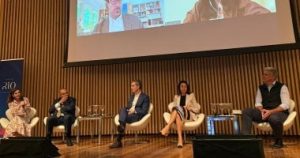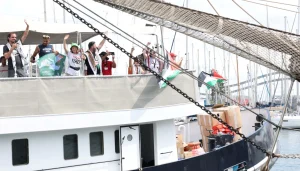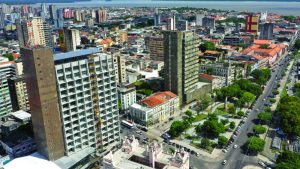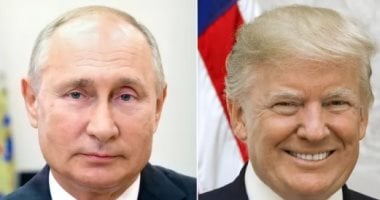As much attention as the announcement of the upcoming summit this week between US President Donald Trump and Russian President Vladimir Putin has received worldwide, the venue chosen for this summit has attracted even greater interest. On the coming Friday, a historic event will take place as Putin becomes the first Russian president to visit the state of Alaska, which was part of the Russian Empire until the 19th century before being sold to the United States. This choice has caused relief in Russia, according to The Washington Post, and Western concern about the symbolic implications of the location amid the Ukraine war. Reports indicate that no Russian leader has visited Alaska before. During the Soviet era, leaders like Nikita Khrushchev, Alexei Kosygin, and Leonid Brezhnev visited the US, as did Mikhail Gorbachev and Boris Yeltsin multiple times.
The US purchased Alaska from Russia in 1867 for $7.2 million, about 2 cents per acre. Russian officials and commentators have expressed satisfaction with holding the Trump-Putin summit in Alaska, the first invitation of a Russian president to the US outside the UN since 2007. The summit appears unlikely to yield Kremlin concessions on the Ukraine war. European and Ukrainian officials quickly responded to the sudden US policy shift. Just days before the summit announcement, Trump expressed frustration over ongoing Russian shelling of Ukrainian cities and promised tougher sanctions. Kirill Dmitriev, Russia’s special economic envoy and a key interlocutor between the Kremlin and Trump’s administration, said the decision to hold the summit in Alaska carries symbolic importance for US-Russia partnership. Dmitriev wrote on platform X that Alaska, born Russian-American with Orthodox roots, forts, and fur trade, resembles these ties and makes the US a polar state.
Russian billionaire Konstantin Malofeev, sanctioned by the Obama administration for allegedly funding pro-Ukrainian separatists, said Alaskans respectfully remember their Russian past and Orthodox present. Russian war correspondent Alexander Kots called the Alaska meeting a strong opportunity to become historic, unless the West tries to devise another plan. Western analysts warn Trump to be cautious. Michael McFaul, former US ambassador to Russia under Obama, tweeted that Trump chose to host Putin in a part of the former Russian Empire and wondered if Trump knew that Russian nationalists claim losing Alaska, like Ukraine, was a mistake Russia needs to correct. Sam Greene, Russian politics professor at King’s College London, said the location choice favors Russia, describing the symbolism as horrific, as if designed to show that borders can change and land can be bought and sold, noting Russian rhetoric still claims Alaska must be returned to Russia.
The New York Times commented that Putin sees the summit not only as an opportunity to end the Ukraine war on his terms but also to divide the Western security alliance. Last month, Putin faced a harsh reality, on the verge of losing Trump, the only Western leader willing to help him achieve his goal of tearing apart the European security system. After months of trying to push Putin to end the war, Trump grew tired of unproductive calls and talks and began issuing warnings. Worse for Putin, Trump started strengthening his relationship with Ukrainian President Volodymyr Zelensky despite their earlier White House feud. It is unclear if Trump is ready to implement his threats of punitive tariffs on countries buying Russian oil or the real impact of such a move on Moscow.
However, the deadline Trump set for Putin to end the war was approaching quickly, prompting Putin to slightly change course. Despite previous Russian officials’ refusal to negotiate land in the Russia-Ukraine war, Putin left an impression on Trump’s special envoy Steve Witkoff, who visited the Kremlin last week, that Russia is now willing to engage in some land agreements. On Friday, Trump said: ‘We will recover some lands, and we will have some swaps; there will be some land exchanges beneficial to both.’ The New York Times said Putin spoke a language Trump understands, the language of real estate, to secure something he has sought since January: a private meeting with the US president, without Zelensky’s presence, to present his case and make a deal.
The newspaper quoted Sam Greene saying last week was good for Putin, adding he ‘pulled himself out of a very weak position, and the whole campaign is almost aligned with what he needed.’













Recommended for you
Exhibition City Completes About 80% of Preparations for the Damascus International Fair Launch
Talib Al-Rifai Chronicles Kuwaiti Art Heritage in "Doukhi.. Tasaseem Al-Saba"
Unified Admission Applications Start Tuesday with 640 Students to be Accepted in Medicine
Egypt Post: We Have Over 10 Million Customers in Savings Accounts and Offer Daily, Monthly, and Annual Returns
His Highness Sheikh Isa bin Salman bin Hamad Al Khalifa Receives the United States Ambassador to the Kingdom of Bahrain
Al-Jaghbeer: The Industrial Sector Leads Economic Growth